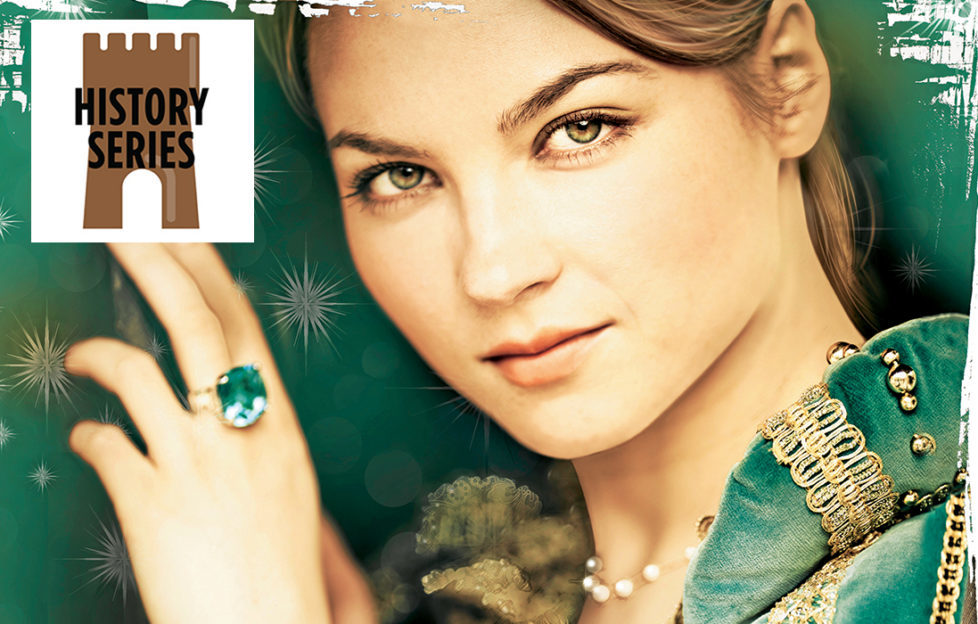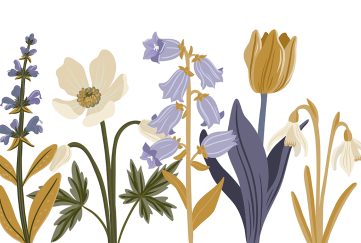To The End Of Time

WRITTEN BY ELIZABETH LOUPAS
There was a dark, compelling quality about the Grand Duke’s alchemist, but I would not be compelled…
The Feast of the Epiphany,
1576 Florence, Italy
“The gifts of the Magi,” said the Grand Duke. With a flourish he cast a powder into the fire. “Myrrh, frankincense, and gold.” Sparks like yellow stars burst from the flames.
“Sorcery,” gasped the woman in front of me.
“Alchemy, you fool,” said the Duchess of Bracciano. She was Isabella de’ Medici, the Grand Duke Francesco’s sister, so she was well-placed to know. In fact, everyone in Florence knew about the Grand Duke’s obsession with alchemy. Only newcomers whispered of magic.
Newcomer I was not. I had been in Duchess Isabella’s household for fifteen years, since we were both young girls. I was her librarian, one of her readers – valued rather as a middling-fine piece of furniture might be valued.
For a long time I had not cared – after my brief, disastrous marriage and my husband’s death I had wanted nothing from life but to be safe. Lately, however, the court of the Medici seemed less safe every day.
Duchess Isabella had secrets. The Grand Duke was unpredictable. There had been conspiracies, disappearances.
I was thirty-four, a childless widow with no family, no home or property and not so much as a silver quattrino to my name beyond the salary Duchess Isabella paid me. I had nowhere else to go.
Flanking the Grand Duke on the dais were his familiars, a tall man in unrelieved black and a young woman wearing a white linen robe like a novice nun’s. Everyone was used to seeing them – the man was an Englishman, the Grand Duke’s chief metallurgist and alchemist, and the girl was what he called his soror mystica, his sister in the alchemical arts.
Tonight, however, another man stood with them, quietly passing the Grand Duke the powders he used to create his pyrotechnic effects. This man was dressed as an artisan, in a leather jacket, and his face was in shadow.
More sparks fountained upward. The crowd cried out with awe. Through the shining golden glitter the unknown man turned his head, and his eyes met mine, not by accident but with deliberation.
It lasted for only a moment, and as the sparks fell back to the dais, I felt as if I were falling as well.
I am Bastiano Rossi, metalworker and artist in pyrotechnics
Later there was music and dancing. The Grand Duke and the Grand Duchess withdrew. Duchess Isabella danced with Troilo Orsini, caressing him openly, thinking herself safe.
I could not leave the room before she did, but I found a window embrasure where I could sit with a curtain partly concealing me. It made me feel partly safe. I could sip my wine in peace and –
“Madonna Giulia.”
I jumped, and spilled some of the wine. Hastily I put the glass aside.
It was the artisan. I was surprised he had not gone away with the Grand Duke’s other servants; in the candlelit extravagance of the night, with its silks and jewels and perfumes, kisses and lies, his dark simplicity was out of place.
“You know my name,” I said.
“Yes.” He did not bow, as a courtier would have done. “You are Donna Giulia Villani. I am Bastiano Rossi, metalworker and artist in pyrotechnics.”
I could not imagine why he had approached me. Yes, there had been that moment when our eyes met, but for him to approach and speak to me was not suitable to our respective stations.
“I am not so far beneath you as you might think,” he said. There was a glint of bitter humour in his eyes, as if he knew something I did not. “I am high in the Grand Duke’s favour, particularly after tonight. I plan to rise higher.”
I wanted to say What has that to do with me? but I did not wish to create a disturbance. Instead I said coolly, “Then I wish you good fortune, Messer Bastiano,” and stepped past him.
Quite deliberately he laid his hand upon my wrist.
I stopped. I no longer saw the colours or smelled the heady scents, felt the heat of the room, heard the music or the fireworks in the night sky. Every sense I had seemed concentrated on my wrist, where his work-roughened fingers lay dark against the gold lace of my sleeve.
The cosmos lurched back into existence and I pulled my hand away.
“How dare you!” I exclaimed.
I have asked the Grand Duke if I might take you as my wife, and he has agreed
“I dare,” he said, “because I have asked the Grand Duke if I might take you as my wife, and he has agreed. He has given me a small estate, toward Siena, where we will live and I will do my work for him. It is a done thing, Madonna. The Grand Duke will inform Duchess Isabella tomorrow.”
I stared at him, trying to form words.
Has the Grand Duke gone mad?
“You wish to ask why,” he said, with perfect calmness. “Why you, why me, why now? Why, when you are thirty-four years of age – yes, Madonna, I know the date of your birth – and I am but twenty-eight? Why, when you are of aristocratic blood and I am an artisan barely one step away from the forge? Has the Grand Duke gone mad? Is that not what you wish to ask?”
“Yes,” I said. “All of that.”
He smiled. He was not a handsome man, as handsomeness was judged among the men of the court. His features were too blunt, his brows too straight and heavy, his skin too coarsened by work and the sun. Yet he had fine white teeth and when he smiled he became – well, if not attractive, at least approachable. His eyes were the colour of brandywine, dark golden brown.
“I wish to rise in the world,” he said. “To do that I must be able to read scientific treatises in Latin and Greek. You are Duchess Isabella’s librarian. You can open the world of books for me.”
“How do you know my position?”
“I have been assisting the Grand Duke for some months. I have watched and learned. Tonight after the demonstration, when the Grand Duke was pleased with himself, I put my request to him and he granted it.”
“He cannot give me away as if I were a horse or a dog.”
He can do as he pleases
“He is the Grand Duke, Madonna – he can do exactly as he pleases.”
I tried another tack. “If you want a teacher, you need not marry one. I am –”
“Beautiful,” he said.
The single word took the breath away from both of us, I think. After a moment he said in a more ordinary voice, “You are beautiful, in my eyes.”
I felt dizzy. He took my arm again. His touch was firm, proprietary.
“I am not beautiful,” I said.
“You think not? You are elegant as a swan, Madonna, serene and quiet. To me you are more beautiful than Duchess Isabella herself.”
“I do not even know you. I will refuse.”
“It is a done thing,” he repeated. “We will marry at Candlemas.”
It was his certainty, I think, that made me determined to resist him. It was not exactly distaste for the difference in our stations – artisans had risen to be gentlemen in the past, and nobles had sunk into meanness. It was not entirely the difference in our ages. It was not fear of a man – I had been married, after all, however unhappy I might have been. A small estate, toward Siena; that meant escape from the court. Freedom. Safety, real safety. It would be like heaven.
Yet he took it as a matter of course. What would he do if it were not so easy?
There can be no marriage unless I consent
“Done thing or no, Messer Bastiano,” I said, taking my arm as my own again, “there can be no marriage unless I consent. For that I have a condition.”
He looked at me. “What is it?”
Did I want him to be able to fulfil the condition, or did I want it to be impossible, so his assurance would be humbled? I thought desperately of the folk-tales I had read, of princesses sending knights on quests, of millers’ daughters spinning straw into gold –
Gold. Sparks like yellow stars.
Did I want him to win or lose? To go on as I was, or step into the unknown?
I took a single breath and cast my dice.
“You created sparks like stars for the Grand Duke tonight,” I said. “They appeared, and in the blink of an eye they were gone again.”
“Such is the nature of sparks.” There was wary curiosity in his expression.
“Bring me sparks that will last until the end of time,” I said. “Then, Messer Bastiano, I will consent to marry you.”
The days between Epiphany and Candlemas crept by. The court buzzed with the story, the artisan who demanded the hand of a lady and the odd condition the lady had set. The Grand Duke himself professed amusement.
I kept aloof as best I could. Some days I wanted Messer Bastiano to produce his eternal sparks. Other days I wanted him to fail, leave me to whatever fate awaited me among the Medici.
On Candlemas Eve we gathered in Duchess Isabella’s salon. The Grand Duke himself honoured us with his presence. Everyone was dressed in their brilliant best, blue, scarlet, gold and green. Candles blazed, hundreds of them.
The doors opened. The footmen stood back. Messer Bastiano Rossi walked in as if he did not care what anyone thought of him, wearing his artisan’s leather jacket, carrying a box of simple polished wood. He looked dark and rough, though he was clean and freshly barbered.
I heard breaths drawn and whispers. Duchess Isabella flushed slightly, as she did when looking at a man she desired.
Fulfill it now, before us all
“So, Messer Bastiano,” the Grand Duke said. He was smiling. “You have been given a condition. Fulfill it now, before us all, and Donna Giulia will be yours.”
The artisan looked at him briefly, then looked at me for a long time. He bowed. It was not a courtly bow – it was as if he wanted to flaunt the fact that he was not a gentleman. He was a man of earth and metal and darkness and flame, and he had come to claim what he desired.
Fans made the air move. The lady beside me moaned very softly.
“You asked me to give you sparks that would last until the end of time,” he said. His voice carried, deep and clear. “Very well. I give you this.”
He opened the box. Inside lay a clessidra, a sand-glass. It was very simple, just two teardrop-shaped glass globes connected at their slender points, the connection wrapped in thread and sealed with wax. The upper globe appeared to be filled with sand.
He took the glass from the box and held it up suddenly, so it caught the light. The sand glittered and dazzled as it fell from the top to the bottom, because in the light we could all see it was not sand at all, but tiny flakes of gold and silver.
“Sparks,” he said, to me and me alone. He turned the glass and the shower of sparks began again. “Sparks that will last hour by hour, and never end.”
There was silence for a moment, then cries of delight and laughter and applause. I heard the Grand Duke say something but I never knew what it was.
I stepped forward. He put the clessidra into my hands. I turned it over once, feeling its cool weight, admiring the quality of the craftsmanship, watching the sparks fall. A man who could make such a thing, I thought, was a man who could be trusted.
I looked up at him, and smiled, and said, “I will wed you, Messer Bastiano.”
He laid his hand on my wrist, just as he had done on Epiphany night. I could feel the heat of his fingers.
“You will never be sorry, Donna Giulia,” he said softly. “Never, to the end of time.”





